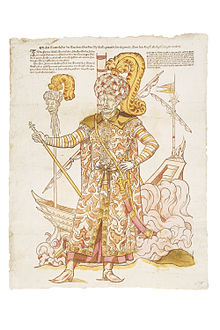- Müezzinzade Ali Pasha
-
For other people named Ali Pasha, see Ali Pasha (disambiguation).
Muezzinzade[1] Ali Pasha (Turkish: Müezzinzade Ali Paşa; died 7 October 1571) was an Ottoman statesman and military officer. He was Kapudan Pasha (Grand Admiral) in command of the Turkish fleet at Lepanto, where he was killed.
Contents
Background
He was the son of a muezzin and had himself issued the call to prayer from his father's mosque which overlooked the sultan's seraglio. He was a favorite of Sultan Selim II and of the women of the seraglio who had greatly admired his voice, and like Piyale Pasha he married one of Selim's daughters.
Ottoman Conquest of Cyprus
Main article: Ottoman–Venetian War (1570–1573)Ali Pasha, with a fleet eventually numbering 188 galleys, fustas, transports and other ships, carried the main land force, commanded by Lala Mustafa Pasha, for the Ottoman invasion and conquest of Cyprus from Constantinople on 16 May 1570 to Cyprus, where they landed on 3 July. While Lala Mustafa commanded the eventual capture of the island from Venice, Ali Pasha took the bulk of his fleet to Crete and then to Morea, thereby effectively preventing any Christian relief fleet from coming to the aid of the besieged defenders of Cyprus.
Battle of Lepanto
Ali Pasha was commander-in-chief of the Ottoman naval forces at the Battle of Lepanto on 7 October 1571. Selim had entrusted him with one of the most precious possessions of the Ottoman Sultans, the great "Banner of the Caliphs", a huge green banner heavily embroidered with texts from the Qur'an and with the name of Allah emblazoned upon it 28,900 times in golden letters. It was intended to provide an incentive for him and his men to do their best in battle.
Still quite young, like his counterpart Don Juan, he was more of a land soldier than a naval tactician, and his failure to keep his lines together and keep his individual squadrons from charging like cavalry units in a land battle allowed the Christian forces to penetrate his battle line in various places and to surround and defeat the isolated ships. He was also somewhat of a firebrand and almost immediately sought the direct confrontation with his opposite number. His flagship, the galley Sultana, battled head-to-head with Don Juan's flagship La Real, was boarded and, after about one hour of bloody fighting, with reinforcements being provided to both sides by other galleys in their respective fleets, was captured. Ali Pasha died at the hands of a Macedonian employed by the Venetians:[2] he was shot in the head by a musket ball, fell to the deck and was beheaded by a zealous Spanish soldier. His head was then displayed upon a pike. This, and the capture of the Banner of the Caliphs by the Real, led to a collapse in Turkish morale, greatly contributing to their rout in the battle.
Literature
- Currey, E. Hamilton, Sea-Wolves of the Mediterranean, John Murrey, 1910
- Bicheno, Hugh, Crescent and Cross: The Battle of Lepanto 1571, Phoenix, London, 2003 ISBN 1 84212 753 5
- T.C.F. Hopkins, Confrontation at Lepanto, Tom Doherty, New York, 2006 ISBN 0 765 30538 0
References
 Seamen of the Ottoman Empire
Seamen of the Ottoman EmpireKapudan Pashas Zagan Pasha · Veli Mahmud Pasha · Gedik Ahmed Pasha · Mesih Pasha · Hersekzade Ahmed Pasha · Süleyman Pasha · Barbaros Hayreddin Pasha · Sokollu Mehmed Pasha · Sinan Pasha · Piyale Pasha · Müezzinzade Ali Pasha · Kılıç Ali Pasha · Cigalazade Yusuf Sinan Pasha · Kemankeş Mustafa Pasha · Gazi Hüseyin Pasha · Kara Musa Pasha · Merzifonlu Kara Mustafa Pasha · Mezzo Morto Hüseyin Pasha · Baltaci Mehmed Pasha · Koca Bekir Pasha · Cezayirli Gazi Hasan Pasha · Koca Mehmet Husrev PashaOther important seamen Kemal Reis · Piri Reis · Aydın Reis · Turgut Reis · Kurtoğlu Muslihiddin Reis · Salih Reis · Seydi Ali Reis · Murat Reis · Kurtoğlu Hızır ReisCategories:- Ottoman Empire admirals
- Pashas
- 1571 deaths
- Ottoman military personnel killed in action
Wikimedia Foundation. 2010.

